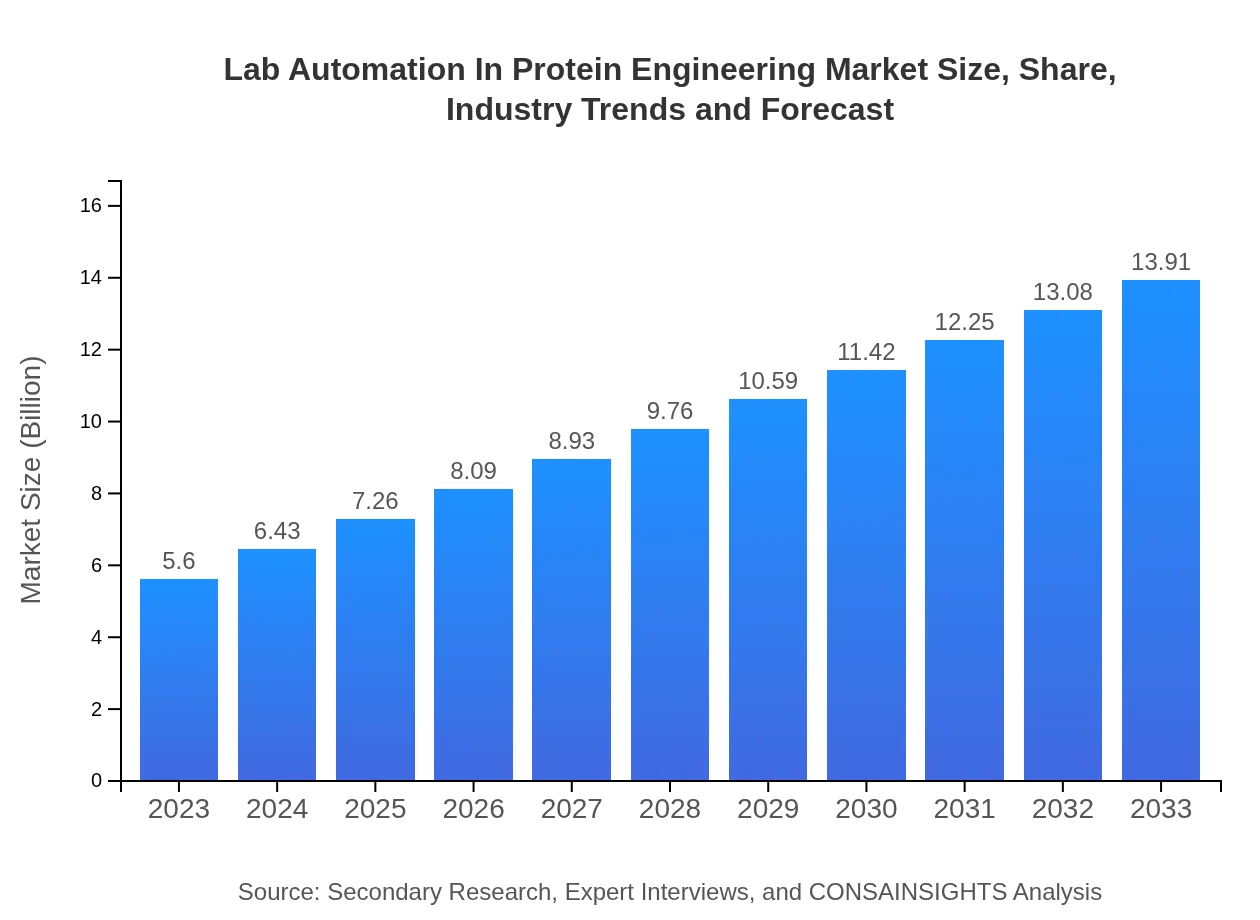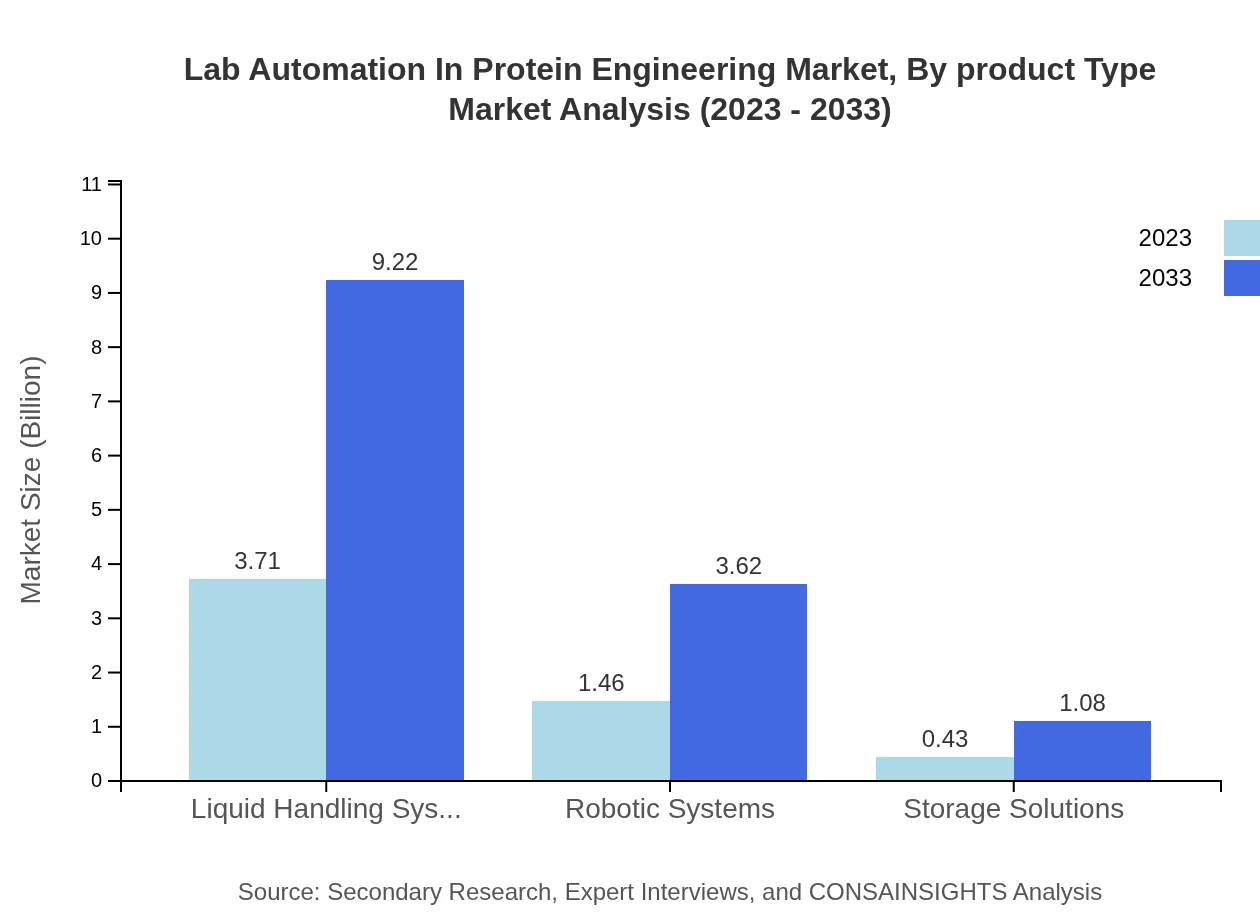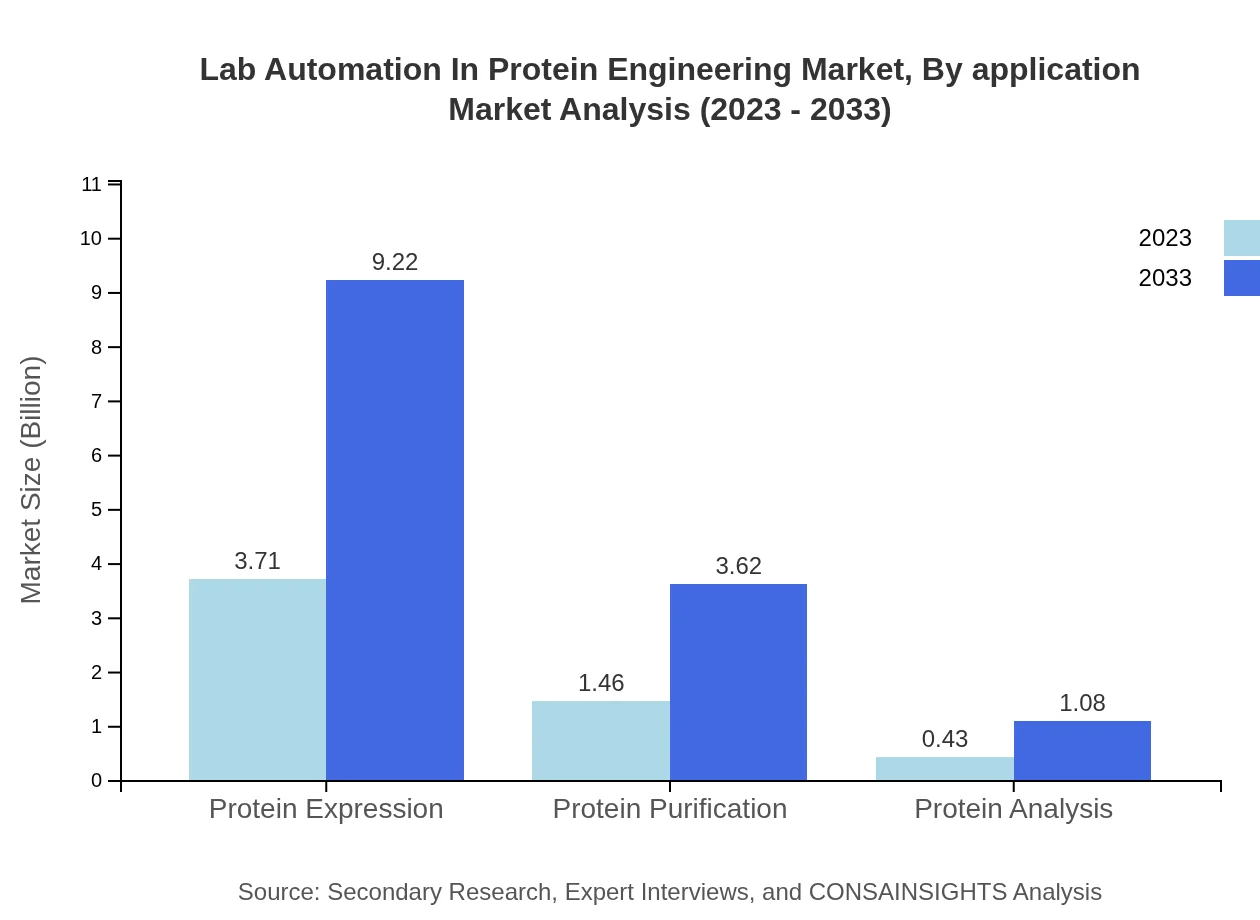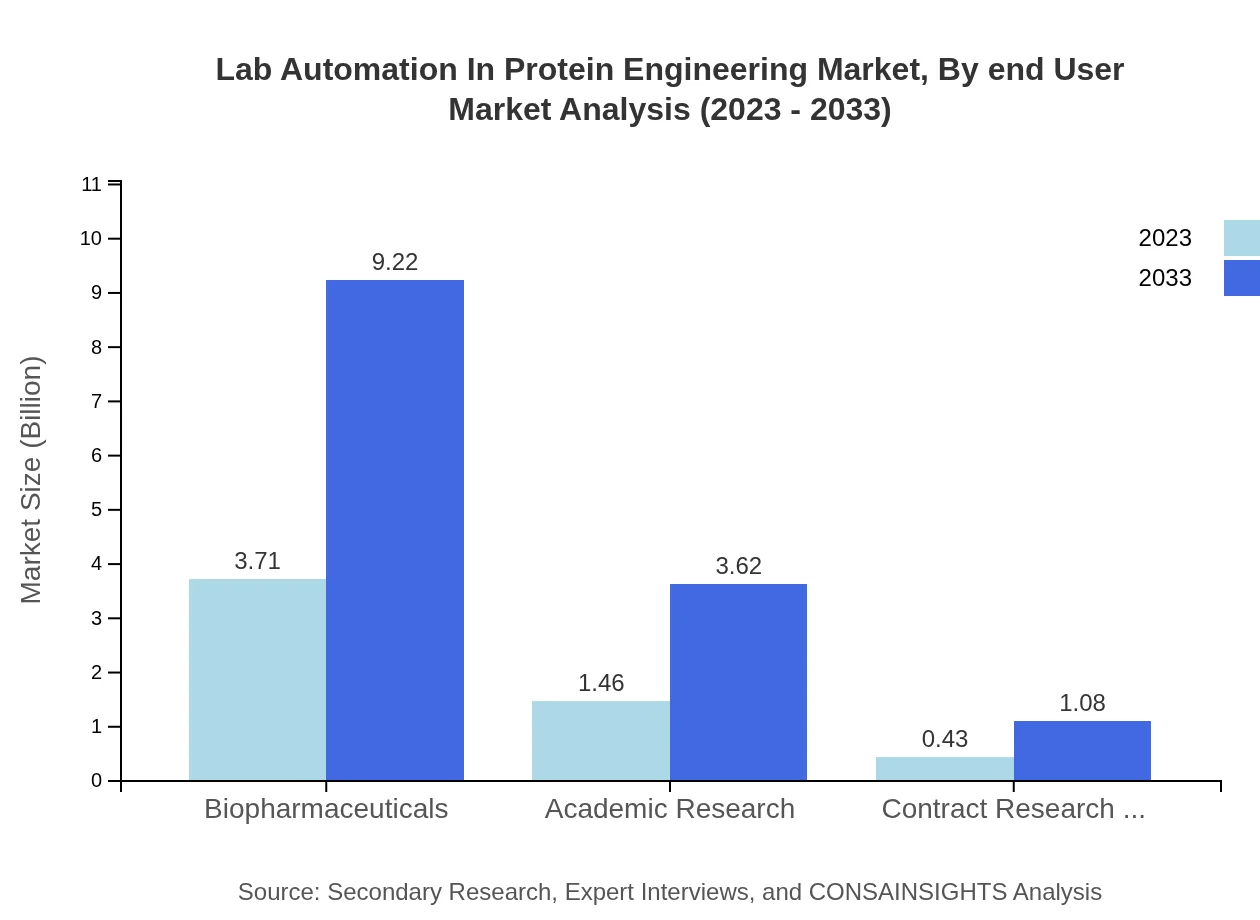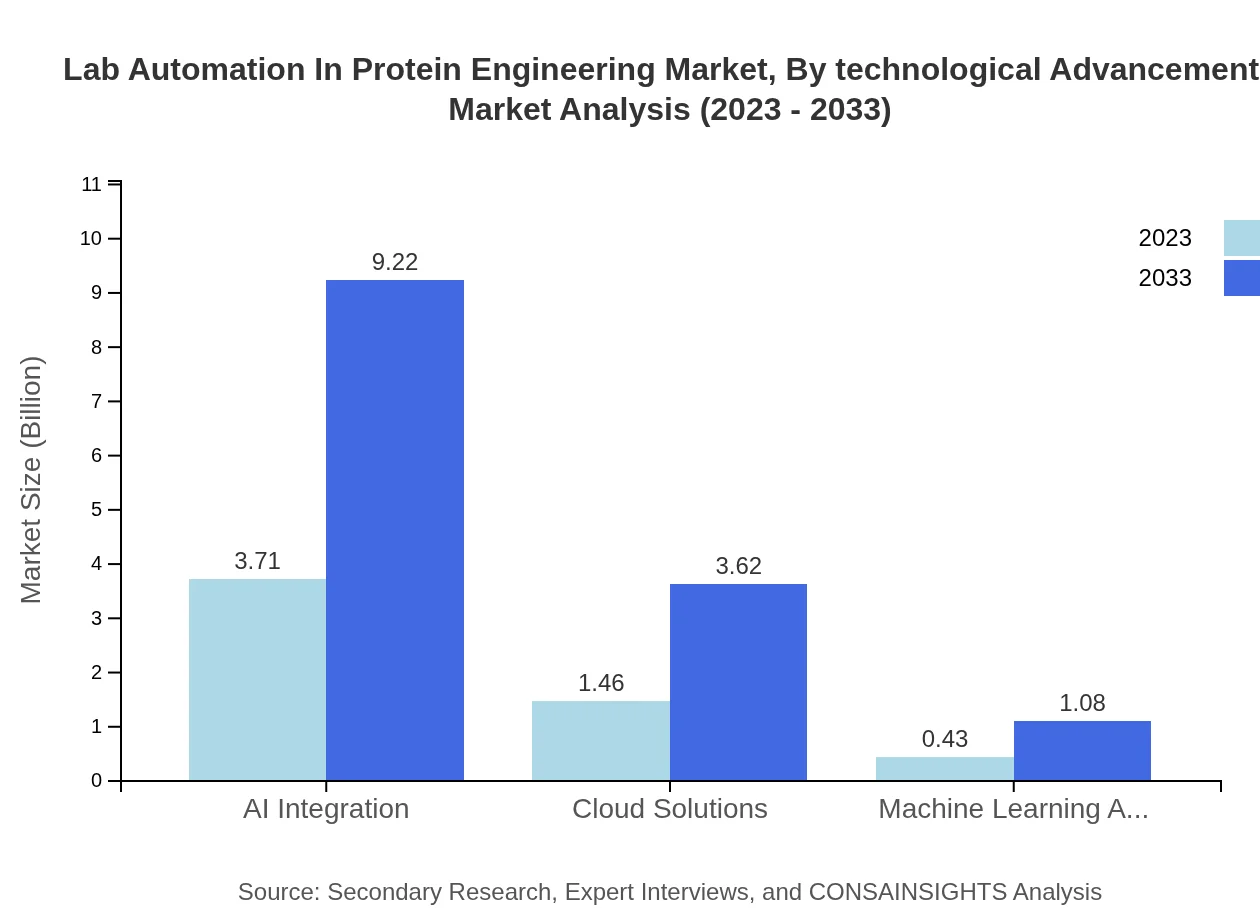Lab Automation In Protein Engineering Market Report
Published Date: 22 January 2026 | Report Code: lab-automation-in-protein-engineering
Lab Automation In Protein Engineering Market Size, Share, Industry Trends and Forecast to 2033
This report provides an in-depth analysis of the Lab Automation In Protein Engineering market, highlighting current trends, future forecasts, and key market dynamics from 2023 to 2033, offering valuable insights into growth opportunities within the industry.
| Metric | Value |
|---|---|
| Study Period | 2023 - 2033 |
| 2023 Market Size | $5.60 Billion |
| CAGR (2023-2033) | 9.2% |
| 2033 Market Size | $13.91 Billion |
| Top Companies | Thermo Fisher Scientific, Agilent Technologies, Danaher Corporation |
| Last Modified Date | 22 January 2026 |
Lab Automation In Protein Engineering Market Overview
Customize Lab Automation In Protein Engineering Market Report market research report
- ✔ Get in-depth analysis of Lab Automation In Protein Engineering market size, growth, and forecasts.
- ✔ Understand Lab Automation In Protein Engineering's regional dynamics and industry-specific trends.
- ✔ Identify potential applications, end-user demand, and growth segments in Lab Automation In Protein Engineering
What is the Market Size & CAGR of Lab Automation In Protein Engineering market in 2033?
Lab Automation In Protein Engineering Industry Analysis
Lab Automation In Protein Engineering Market Segmentation and Scope
Tell us your focus area and get a customized research report.
Lab Automation In Protein Engineering Market Analysis Report by Region
Europe Lab Automation In Protein Engineering Market Report:
Europe's market for Lab Automation In Protein Engineering is forecasted to rise from $1.60 billion in 2023 to $3.98 billion by 2033, supported by stringent regulations promoting standardized research practices and a robust biotechnology sector.Asia Pacific Lab Automation In Protein Engineering Market Report:
The Asia Pacific region is anticipated to grow significantly, from $1.08 billion in 2023 to $2.69 billion by 2033, driven by increasing investments in biopharmaceutical development and rising adoption of automation technologies in research institutions.North America Lab Automation In Protein Engineering Market Report:
North America held the largest share in the Lab Automation In Protein Engineering market, projected to grow from $2.05 billion in 2023 to $5.10 billion in 2033, bolstered by the presence of leading companies and increased funding for research and development.South America Lab Automation In Protein Engineering Market Report:
In South America, the Lab Automation In Protein Engineering market is expected to move from $0.24 billion in 2023 to $0.60 billion by 2033, with growth fostered by the expansion of research organizations and healthcare sectors seeking to enhance laboratory efficiencies.Middle East & Africa Lab Automation In Protein Engineering Market Report:
The Middle East and Africa market is set to experience growth, anticipated to rise from $0.62 billion in 2023 to $1.54 billion by 2033, as countries invest more in healthcare and life sciences research, promoting lab automation.Tell us your focus area and get a customized research report.
Lab Automation In Protein Engineering Market Analysis By Product Type
The product types predominantly include liquid handling systems, robotic systems, and storage solutions. Liquid handling systems are the largest segment, constituting 66.24% of the market in 2023 and maintaining this share through to 2033 due to their critical role in high-throughput applications. Robotic systems account for a significant 26.02% share, reflecting ongoing advancements in mechanization of laboratory tasks.
Lab Automation In Protein Engineering Market Analysis By Application
Biopharmaceutical applications dominate the market, holding a 66.24% share in 2023, driven by the need for rapid and accurate protein analysis in drug development. Academic research is another significant segment, with a 26.02% share, as institutions increasingly adopt automation to enhance research outcomes.
Lab Automation In Protein Engineering Market Analysis By End User
End-users include biopharmaceutical companies, academic institutions, and contract research organizations. Biopharmaceutical companies are the primary consumers, significantly driving market revenue due to their extensive protein engineering requirements. Academic institutions are showing increased demand for automation, driven by a necessity for efficient research methodologies.
Lab Automation In Protein Engineering Market Analysis By Technological Advancements
Technological advancements such as AI integration and cloud solutions are transforming the lab automation landscape. AI integration allows for predictive analytics and enhanced decision-making, ensuring better research outcomes. Cloud solutions provide scalability and access to large datasets, aiding researchers in data management and collaboration, which are becoming pivotal in protein engineering.
Lab Automation In Protein Engineering Market Trends and Future Forecast
Tell us your focus area and get a customized research report.
Global Market Leaders and Top Companies in Lab Automation In Protein Engineering Industry
Thermo Fisher Scientific:
A leader in the life sciences industry's lab automation solutions, providing a comprehensive range of products that enhance laboratory productivity.Agilent Technologies:
Specializing in analytical instruments and automation solutions, Agilent plays a significant role in enhancing protein engineering research efficiency.Danaher Corporation:
A global science and technology innovator, Danaher leverages advanced technologies to improve laboratory automation and workflow.We're grateful to work with incredible clients.









FAQs
What is the market size of lab Automation In Protein Engineering?
The global market size for lab automation in protein engineering is projected to reach approximately $5.6 billion by 2033, growing at a CAGR of 9.2%. This growth reflects increasing investments in biotechnology and automation technologies.
What are the key market players or companies in this lab Automation In Protein Engineering industry?
Key players in the lab automation in protein engineering market include major biotechnology firms, robotics manufacturers, and software developers. Prominent companies focus on providing integrated solutions that enhance laboratory efficiency and throughput.
What are the primary factors driving the growth in the lab Automation In Protein Engineering industry?
Growth in the lab automation market is primarily driven by advancements in biotechnology, increased research and development activities, and the need for high-throughput screening methods. The demand for faster drug discovery processes also significantly contributes.
Which region is the fastest Growing in the lab Automation In Protein Engineering?
North America emerges as the fastest-growing region in the lab automation market, expected to expand from $2.05 billion in 2023 to $5.10 billion by 2033. Europe and Asia Pacific follow closely, indicating strong potential across these regions.
Does ConsaInsights provide customized market report data for the lab Automation In Protein Engineering industry?
Yes, ConsaInsights offers customized market report data to meet specific business needs in the lab automation sector. Clients can access tailored insights and analyses based on their unique requirements and market interests.
What deliverables can I expect from this lab Automation In Protein Engineering market research project?
Deliverables from the lab automation market research project typically include comprehensive market analysis, segment insights, regional forecasts, competitive landscape assessments, and actionable business recommendations tailored to various stakeholders.
What are the market trends of lab Automation In Protein Engineering?
Key trends in the lab automation market include increased adoption of AI and machine learning, a shift towards miniaturization of lab processes, greater integration of cloud-based solutions, and a growing emphasis on sustainability in laboratory operations.

